The Guide to Keeping Mice as Pets (instead of a hamster)
Created: Apr/18/2022
Did you know that hamsters are the number 1 most neglected and mistreated pets?
That's probably because so much misinformation is spread about hamsters and other small animals. Most people don't do research before purchasing a hamster for their small child.
Let me start off by saying, as someone who's owned probably a hundred animals in my life and as someone who currently owns 16 animals in my house, I've learned a lot about pets over the years. I've owned cats, dogs, hamsters, guinea pigs, mice, rats, bunnies, lizards, various fish, frogs, bugs, and even axolotls. But I've made a lot of mistakes in the past, especially as a young child who didn't think about researching an animal before purchasing an animal at the pet store.
So I hope this guide will teach you things so that you don't make the same mistakes as I did as a kid.
- Why hamsters are the worst animals for small children
- Why you should buy mice instead of a hamster
- What are fancy mice?
- General info about mice
- Pros and cons of owning mice
- Is a mouse the right pet for you?
- Everything you need to know before buying mice
Contents
Why Hamsters are the Worst Animals for Small Children
Despite their small size, hamsters are a lot of maintenance. If you're thinking about purchasing an animal for your small child or little sibling to be their first pet, I highly discourage it. Let me tell you why.
For starters, hamsters are not social animals. Making them automatically bad candidates for children that want to carry around and hold and pet them. Most hamsters that are not selectively bred to be used to human interaction, will hate being picked up and interacted with. Hamsters should also not be kept with other hamsters. Unlike other animals like mice and rats, hamsters are not pack animals. In nature, they hunt alone. Hamsters are not used to being around other hamsters, and will most likely fight with or even kill other hamsters that are in their territory. The only exception to this is if hamsters are siblings. Most hamsters that are siblings are used to being around eachother and will most likely not fight.
(However, I would still be careful.)
If you want a happy hamster, you should not force a hamster into your arms if they do not want to be picked up. Hamsters have fragile hearts and can suffer heart attacks from stress or fear. That's why most hamsters are prone to dying "randomly", because they most likely had a heart attack and died. Things like loud noises and sudden movements are the most common to kill a hamster, thats why a young child especially should not have a hamster!
Even if you're owning a hamster in a place away from children and loud sounds, there are still a lot of misinformation spread about these animals which leads them to be neglected.
For example, it is very common for people to buy hamster balls for their hamster. It's shown in countless movies that hamsters "enjoy" hamster balls. But it is actually the worst possible thing you can do for your hamster. Hamsters have bad eyesight, and most likely cannot see through colored plastic. Nor can they see more than a few inches infront of them. Hamsters will run around in hamster balls not because they're having fun, but because they are desperately looking for a way to escape. They cannot comprehend the idea of being inside an object without an exit.
"But I think its cute when they run around in the balls!"
Cool. Then don't get a hamster.
I can't allow you to put a hamster in a terrifying situation for your own enjoyment.
This is only one example of how hamsters are mistreated. If I went into detail about all the ways hamsters are neglected and abused, then this section would go on forever. And this isn't a hamster guide. There are plenty online, however. But I recommend reading articles from trusted sources, and not shitty news sites and DEFINITELY NOT pet store articles.
Remember, surviving is not enheritely thriving.
And honestly, cats and dogs, despite their larger size, are much simpler animals to care for than hamsters. So if you're a new pet owner and are looking for an easy and simple pet. Please do not purchase a hamster.
Why You Should Buy Mice Instead of a Hamster
Don't get me wrong, I'm not trying to pass off some "mice are better than hamster" agenda. (imo they are though) As long as you do adequate research into keeping hamsters, I say go for it. Do what makes you happy. But I strongly believe that a mouse is a way more suitable animal for small children, and people who want to bond with their pet.
Mice and rats are massively misunderstood, as they're seen as dirty and uncleanly and aggressive. However, mice are a dozen times cleaner and kinder than hamsters. Specifically domesticated ones.
Yes! There are domestic mice. Cuter looking mice that look almost like hamsters, aside from their tail. These are called fancy mice.
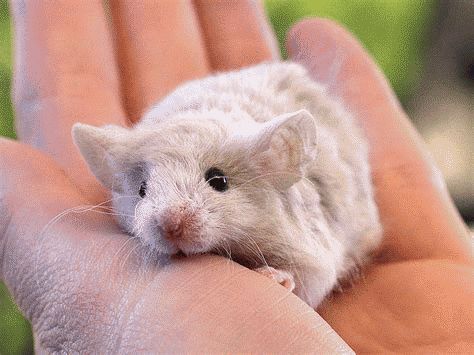
The main reason I believe mice are better for people who want to hold and bond with their pet is because they are very social animals. Mice love to be pet, held, and played with.
Mice can be trained to do tricks as they are very smart. They're extremely social and love attention. Some mice will do things for your attention, such as escape their cage to look for you (or food) or jump out of their cage onto you when you open it up. (Its happened to me before, and its adorable)
Some mice can be trained to chill on your shoulder or in your hoodie pocket while you do your chores or watch television.
I have not successfully trained a mouse before, as most mice I've had in the past were way too energetic for me to be patient with. But I've seen people train their mice to do the average "spin" or "paw" tricks, as well as more advanced things like pulling levers, pressing buttons, putting pegs in holes, ringing a bell, walking a tight-rope, jumping through hoops... I've even seen people train their mice to do puzzles!
"You mentioned fancy mice... Whats that?"
Fancy mouse is a term used to refer to mice that are bred specifically to be kept as pets rather than fed to other animals like snakes.
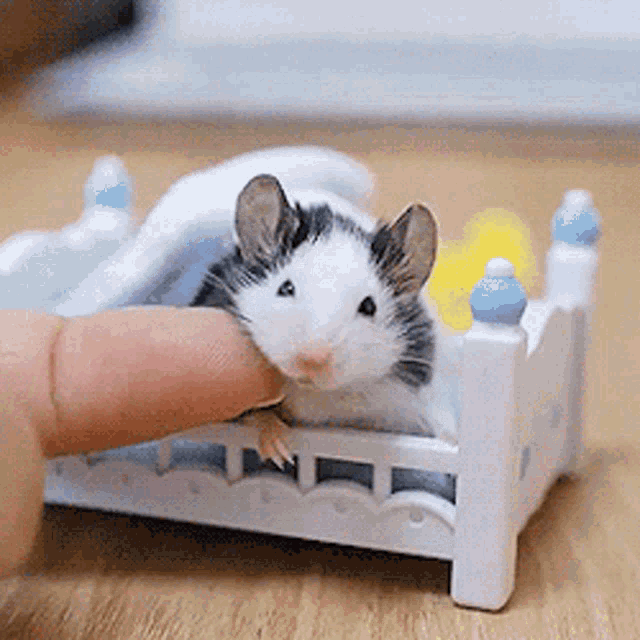 There are two types of mice sold in pet stores. Fancy, and feeder. Feeder mice are almost always white with red eyes, and aren't bred to have strong immune systems or accept human touch. That's why they tend to be more aggressive than fancies.
There are two types of mice sold in pet stores. Fancy, and feeder. Feeder mice are almost always white with red eyes, and aren't bred to have strong immune systems or accept human touch. That's why they tend to be more aggressive than fancies.
Fancy mice are normally pretty colors and have different fur textures.
They normally live longer since they're selectively bred to have better immune systems, and they're used to human touch.
Fancy mice can come in almost every color, some even resemble cat patterns like calico or siamese. Some fancy mice even have certain fur textures, such as curly, satin (silky), long, or hairless.
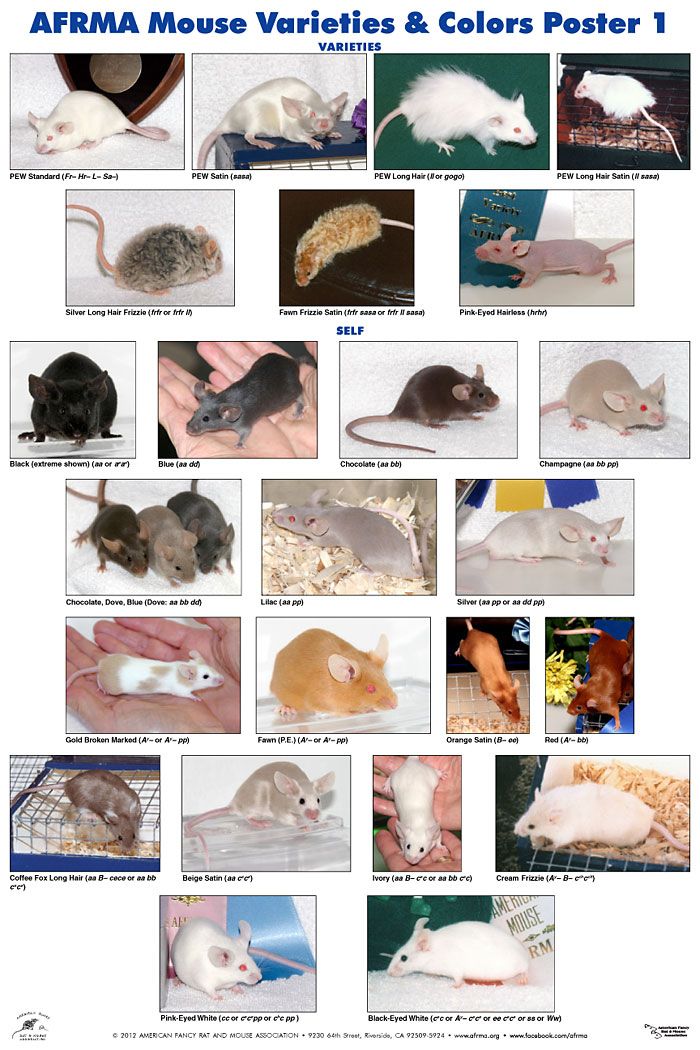
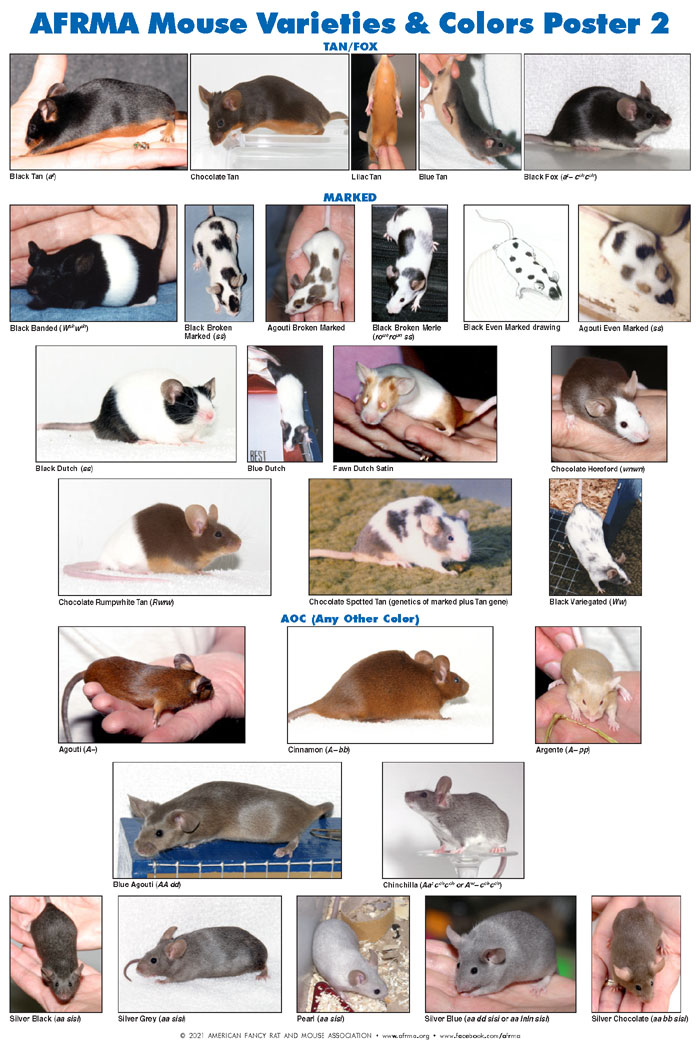
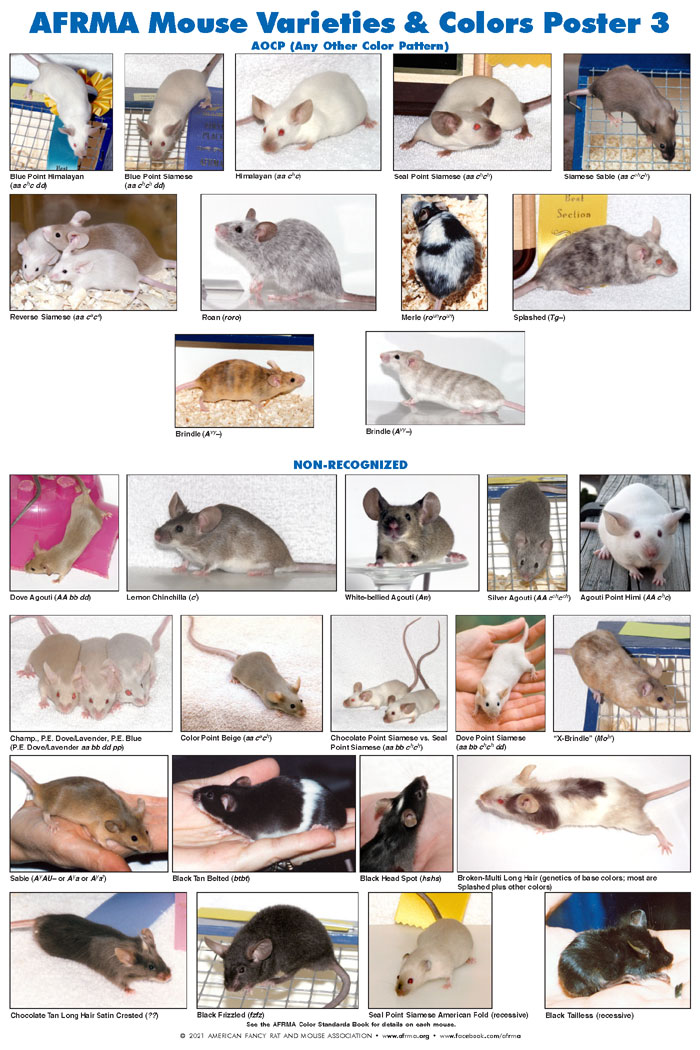
A Little About Mice
Mice are very active and energetic animals, and will spend most of their time playing, grooming, or roaming, instead of sleeping like hamsters do.
Mice are very friendly and social. Unlike hamsters, mice are less likely to be moody or bite you. I've owned plenty of mice, and the only time I've been bitten is if I've accidentally hurt one. And even then, most of the bites were warnings and they never even drew blood.
What do mice eat? Well, mice can eat most foods that humans can! Their diet should consist of mostly vegetables, fruits, nuts, and seeds.
But did you know that DARK CHOCOLATE is actually substancial for mice?
Yes! Dark chocolate contains things that are good for mice, and can help fight off certain diseases. Mice are also able to digest chocolate, as their digestive system is very similar to ours. Meaning it isnt toxic to them like it is to dogs and cats. (but it should still be fed in moderation, as its high in sugar)
It's fun to feed mice various human foods and watch them eat it with their little hands! After all, they are scavenging animals.
But remember, a mouse should be fed a healthy and balanced diet, just like humans.
Just like us, feeding a mouse a diet of 80% junkfood will result in obesity. So while it is cute to watch your mouse bite down on some mini pancakes, remember to feed them healthy food as well.
They should always have a variety of food to pick and chose from, as favorites range from mouse to mouse.
Mice spend most of their time building nests and storing food. Most mice will hoard any food they can, whenever they get the chance, even if they aren't hungry in that moment.
Mice will get territorial over their food if an unrecognized mouse enters their territory. Males tend to be more aggressive than females. It is advised to house females in groups, but males alone, unless they are siblings or fixed.
Mice are pack animals, meaning you can house DOZENS of them together and they will thrive and sustain themselves.
Rodents like mice and rats will establish a hierarchy in their nests. There is the "alpha" mouse, whos normally the strongest or most intimidating one. Other mice are in charge of scavenging food, and some will protect pregnant mothers and the elderly. Some mice are even in charge of keeping the nest clean.
Upon first interactions (if you are introducing mice to eachother) they might fight. But don't worry, most of the time this fighting is a form of establishing dominance.
Mice could easily kill eachother, as they have very sharp teeth and a wicked bite. But almost always, they chose not to. These fights are non-fatal. And they will end after the other mouse "steps down" and accepts their place in the mouse hierarchy.
There will be biting, and there will be squeaking. But these fights should never be separated unless one mouse is seriously injured.
Did you know that mice will cannibalise eachother for various reasons? Some mice will choose to eat the elders if they are starving, because they know that elders are the weakest. Some mice will eat eachother or themselves while stuck in a trap as a form of suicide.
However this most likely won't happen in captivity.
That may seem heartless, but did you know that rats and mice can suffer mental disorders like humans? Mice can develop anxiety, PTSD, or even depression.
Mice can actually die of sadness, because their hearts are very fragile. They can experience grief and sadness just like humans, especially when one of their cagemates die or falls ill.
So it is important to make sure your mice are happy, because a sad and lonely mouse could result in a dead mouse.
When I had mice for the first time, I bought two sisters in a pair. A black one, and a tan spotted one. The black one died young, and the spotted one who was with her her entire life was suffering a depression.
She wouldn't eat, she'd always sleep, she looked sad. But when we got her a new friend, she was back to her happy self in a few days.
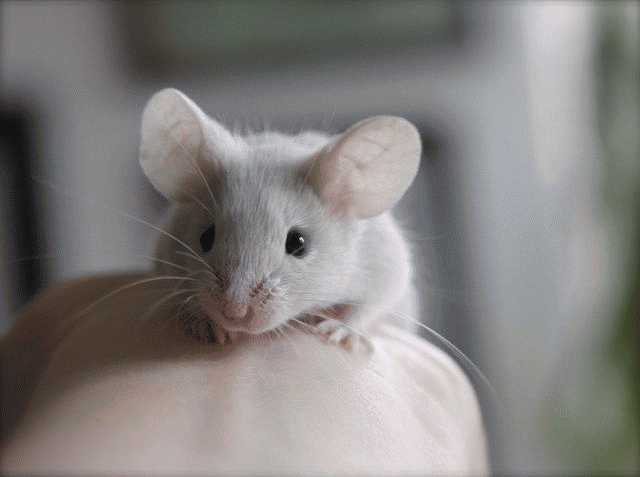
The Pros and Cons of Owning Mice
Before I get to the good part, there are some things you should expect while owning mice. Not every pet is perfect, and just like other pets, mice have pros and cons.
Pros:
- Mice are clean. They have designated bathroom areas in their nests, which means most cages wont need to be deep cleaned every time. Mice will pick one spot in the cage to do their buisiness.
- They are friendly and social. Mice love being picked up and played with. Making them good candidates for children and people who want to bond with their pets.
- Mice are a very cheap pet because they are so small. The most you'll spend on a mouse will be their cage, but everything else is like pocket change.
- Since mice are fast animals, sudden movements won't scare your mouse to death like it would a hamster. Mice actually like playing zoomies like cats do.
- Feeding them is always cheap. Mice can eat most things humans can, so you won't need to buy food as often as you would a dog. Plus they're tiny, so that's smaller portions. A single bag of mouse food could last MONTHS.
- They adapt to new people quickly. A mouse may never bite anyone unless truly threatened, and even if they do, its usually a softer nip as a warning.
- They're smart. Mice will never fail to amaze you with what they come up with. Whether that be completing a cardboard maze you've made for them, building a house, doing a puzzle, or finding a unique and unexpected way to escape their cage.
Which brings us to...
Cons:
- They are escape artists. Mice can squeeze through very tiny spaces, which means they need an enclosure where they can't squeeze out of. Making cages automatically out of the question. Mice should be kept in a tank with a mesh lid and sealed door.
- They destroy everything. When I had mice, we had to buy three wheels. Which wasn't an issue as tiny wheels aren't costly at all. But it's still annoying having to swap out things every few weeks or even days.
- They can't free roam upsupervised because of their size. It's encouraged to let your mice explore a CLOSED environment. Like a small bathroom without any holes in the wall or floor, or tables they could scurry under. It's a nightmare having to get a mouse out of something because they are so fast. Trust me, I've had one run under a couch before.
- This should go without saying but mice shouldn't have direct contact with other animals that aren't mice, like cats and dogs. Even if they can't get to them, the scent of a cat or even a cat looking into their enclosure could be very stressful for your mouse.
That shouldn't be too much of a problem though, I've owned mice while I had 3 cats. Maybe you'll be lucky and your cats will be terrified of the mice like mine were.
- They are so small that it's very easy to hurt or kill them. I've heard many stories of people accidentally sitting on their mice while letting them roam a couch, or stepping on one while looking for them. This isn't the mouses fault though, but you should still be careful. Things like falling from high spots shouldn't be too much of a problem for your mouse however, as mice are naturally climbing animals.
Is a Mouse The Right Pet for You?
I've made a quick diagram that ranks common pets as well as some other pets I've owned in my life. It's important to get a pet that fits your lifestyle.
This is a really rough diagram based off my own personal experience.
Cost: General cost of owning the pet. This does not include initial adoption fees. A higher rating indicates more costly.
Maintenance: General difficulty and resources needed to maintain the pet. Higher rating indicates more effort.
Time: How often you need to maintain your pet and how much time out of your day it takes. Higher rating indicates more time spent.
Amusement: How much enjoyment you'll get out of owning your pet. This should be taken with a grain of salt as I could be bias but it is based the general activity level of the pet and how much time you can spend with them. Higher ranking indicates more fun.
Good with kids: Self explanatory. Is the pet safe for kids? Should kids have this pet?
| Hamster |
Rat | Mice | Dog | Cat | Rabbit | Reptiles |
Fish | |
|---|---|---|---|---|---|---|---|---|
| Cost |  |
 |
 |
 |
 |
 |
 |
 |
| Maintenance |  |
 |
 |
 |
 |
 |
 |
 |
| Time |  |
 |
 |
 |
 |
 |
 |
 |
| Amusement |  |
 |
 |
 |
 |
 |
 |
 |
| Good with kids |  |
 |
 |
 |
 |
 |
 |
 |
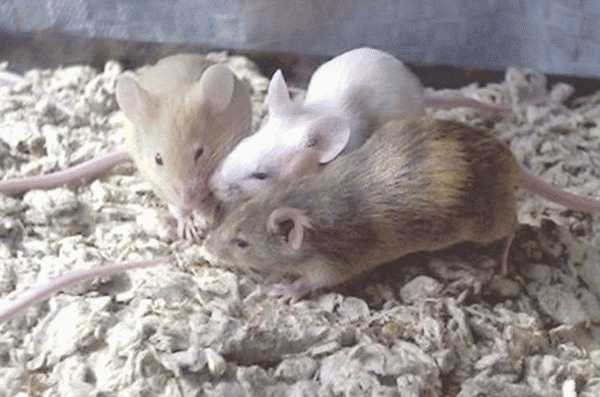
And now for the topic you came here for...
Everything You Need To Know Before You Buy Mice!
So you've decided you want to buy mice?
Here are some things you must know beforehand...
Purchasing mice:
It is highly recommended that you do not purchase mice from pet stores, and buy from mouse breeders instead. Most chain pet stores breed their animals in breeding mills, where they are mistreated and neglected.
Feeder mice and fancy mice are almost always raised the same, and only separated by their appearance. Meaning it is likely fancy mice bought from pet stores will be aggressive and be more suseptible to health complications in the future.
You can find mouse breeders or mice for sale in your area on places like Craigslist or Facebook marketplace/groups. Or even a simple online search of "mouse breeders in/near [town name]" will result in websites by mouse breeders close to you. If you have any small animal conventions or shows in your area, you might find some information on breeders and sellers there, or even mice being sold there.
I've actually found pet rats and mice being sold at reptile conventions. It's all so weird. But as long as you are buying from a breeder that knows what they're doing, you're good.
Although it should be mentioned that professionally bred animals are a little more pricy than most. But I have not seen a mouse sold for more than 20$.
You can also find mice at shelters, although they are rare. Most shelters take only cats and dogs, but there are some that take in small or exotic animals. It's always good to rescue if given the chance.
If you've searched everywhere but can't find any mice for sale in your area, the pet store should always be a last resort. But I will warn you, pet store mice may live shorter lives.
When purchasing your mice, it's important to keep in mind that you will need to purchase them in pairs. Mice cannot live alone, they must be paired with other mice. The minimum is two, but I recommend three, just incase those two don't get along, or one falls sick.
It's easier to bond females than males. If you decide you want a male, you can keep him alone. But it is still encouraged to get him a friend. Although it is a little more difficult to bond males. Your best bet is buying males that are already living together, as they're used to eachother.
Lifespan:
Unfortunately due to their small size, mice don't live for very long. They live an average of 2 years, maybe 3 if you're lucky. I've had a mouse live nearly 3 years, she was extremely old but she was definitely a trooper. Which was ironic since she came from a pet store! You never know.
Health:
Most vets won't take in small animals. And the ones that do don't really offer many services as operating on mice is dangerous because they are so small.
Mice and rats are unfortunately very likely to get tumors. Your pet could be the healthiest in the world and still get a tumor. If this happens, theres nothing you can do other than make sure the pet lives the rest of its life happily. Most tumors arent deadly or cancerous, but if they are, it is recommended to put down your pet rather than risk a surgery which could end up killing them anyway.
The one thing you are able to treat at home is mites and fleas. Rats and mice might get mites sometime in their lives, and it's very easily treatable. There are medications you can purchase online for only a few dollars which you can mix in with their food or water.
The most common condition in mice is a respiratory infection. These normally clear up within a few days, but you should keep an eye on your mouse as this could potentially kill them depending on the severity.
To recognize a respiratory infection, your mouse will frequently sneeze and might breathe strangely or heavily. Sometimes their face will become puffy or red.
To my knowledge, these types of infections come from an unclean or dusty environment, or just poor genetics.
The Enclosure:
It is a common misconception to keep small rodents in a cage. That couldn't be further than the truth. Small rodents, especially mice, are made to be able to squeeze through the smallest of holes. It is encouraged to keep a mouse in a tank. The kind you'd keep a reptile in, but without all of the extra gadgets of course.
Unfortunately, this is probably the most money you're going to spend on a mouse. As a standard tank is normally around 30-60$, depending on where you buy it. However, you can find them on Ebay for way cheaper. If you don't want to pay for shipping, try Craigslist, the thrift store, or a garage sale.
Just make sure to do a deep clean with any used cages, you don't know what was in it.
Mice cannot scale up the glass of a tank, but its still advised to keep a lid on the tank at all times as mice are able to jump pretty high, and squeeze themselves underneath the lid. If you want to be extra careful, you can place a heavy book ontop of the lid.
Inside of the enclosure, mice need plenty of space to dig. I normally fill the tank with 40% bedding. For the bedding itself, I recommend a dust free and dye-less bedding. From my experience, mice seem to prefer shredded paper bedding. It's fluffier, lighter, and easier to shred.
Your mice will need plenty of places to hide underneath, not just one. Depending on how many mice you have, you'll need a variety of hides.
When chosing the hides, I wouldn't get multiple of the same kind. Maybe one wood, one plastic, one fabric, for example.
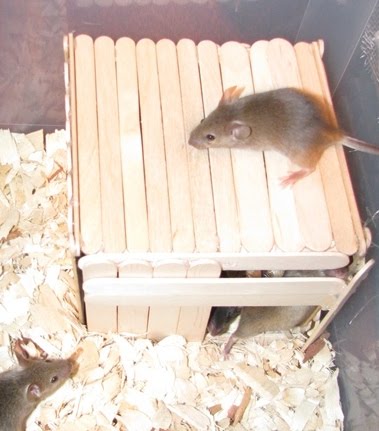 Hides can be made at home using household materials, however. It's really common for people to make popsickle stick houses for their mice, because its cheap, and the mice can chew on the wood.
Hides can be made at home using household materials, however. It's really common for people to make popsickle stick houses for their mice, because its cheap, and the mice can chew on the wood.
Mice are smart enough to know what is food and what is not, so you shouldn't have to worry about your mouse consuming glue. They might chew on it, just to spit it back out. Just make sure its nontoxic and as minimal as possible.
If you don't want to build something, you can always use trash! Mice love it, and it's free. Just make sure its clean. A common thing to use is tissue boxes and toilet paper rolls! You can even connect multiple tissue boxes with toilet paper rolls to create a little maze. Cardboard is completely safe for mice to chew on.
Just make sure you know where the cardboard came from. If you're using a box you recieved in the mail, I'd advise against it. Some factories spray chemicals on their boxes to kill any pests that try to make homes in them, which is most commonly mice. A tissue box shouldn't be a problem though.
Mice will also need more than one wheel. Mice are very active, much more than hamsters. So both of your mice might want to run on the same wheel at the same time.
I highly recommend against metal wheels. They're squeaky, but also dangerous for your mouse. Their small paws could get stuck in the grate.
Your best bet is a plastic wheel, or a flying saucer. Which is like a wheel, but it's tilted on its side and lets gravity do most of the work, making it easier for small animals like mice to use.
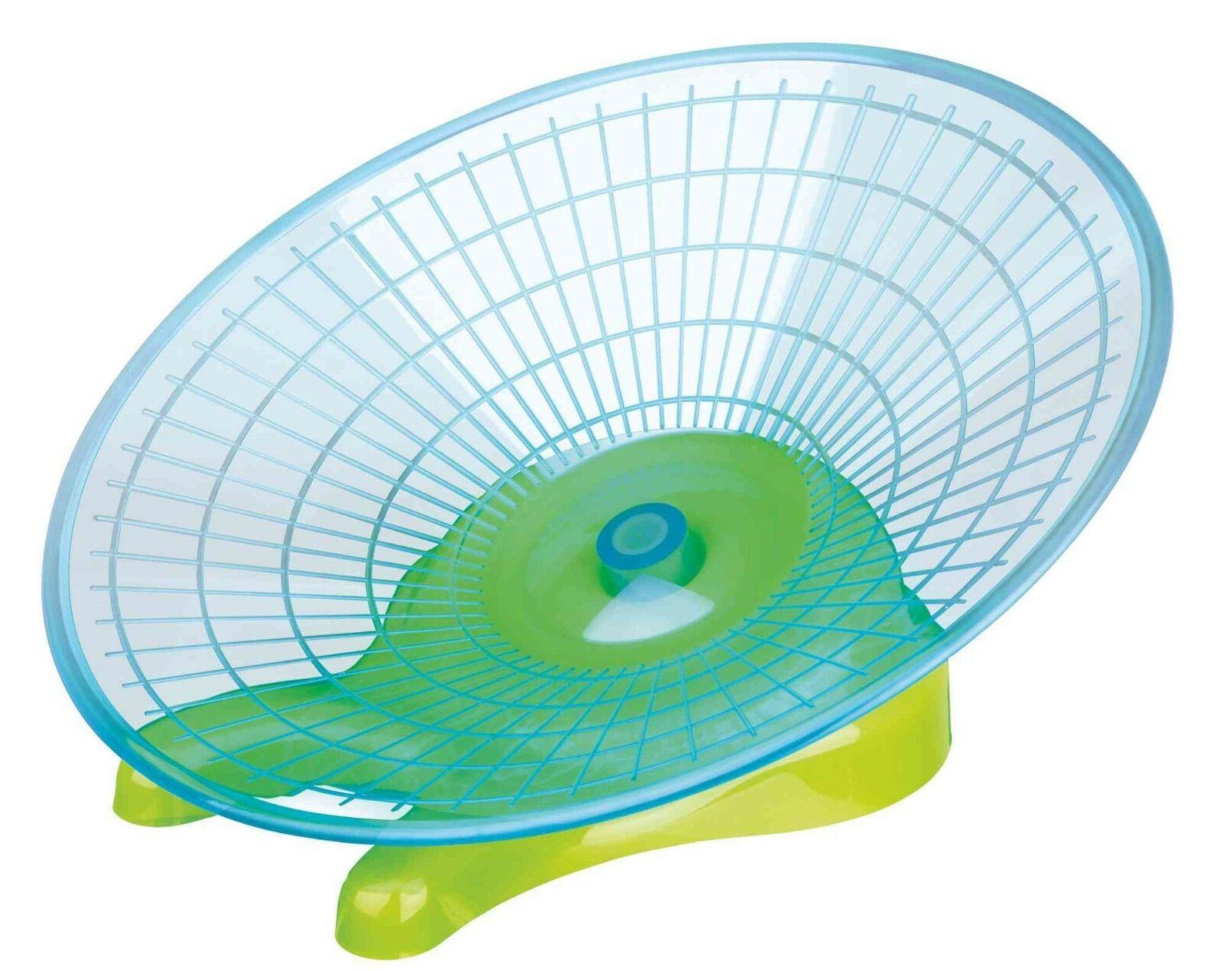
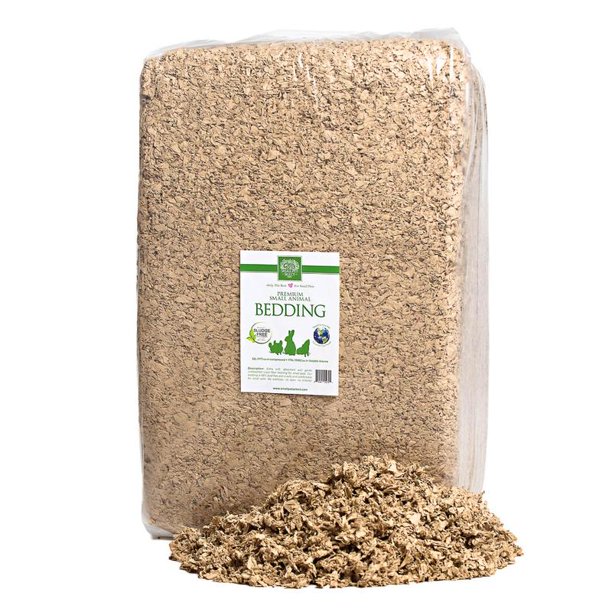
A food bowl is optional. I usually sprinkle food around their cage to encourage them to search for it, to encourage their natural foraging instincts.
However, a waterbottle is recommended over a water bowl. Mice like to throw bedding everywhere and normally get it in the water dish in a matter of minutes, which soaks up or dirties the water.
It's a bit difficult to find waterbottles for tanks though, since most waterbottles are designed to hook on the outside of a cage. But you can find hanging ones, or ones with suction cups instead of hooks.
Here's an example of a cage I love a lot. Obviously yours doesn't need to be as complex and organized as this, but it's a good example of how cluttered their cage should be. And how many hides a small group of mice should need.
This cage in particular could house around 20 mice maximum.

Besides the hides, wheel, bedding, and waterbottle, there's not much more you need besides activities for your mouse.
Activities:
Mice are foraging animals, and they're smart. They get bored rather quickly. So it's important to train their brain with foraging activities.
Honestly, making foraging toys at home is simple.
It's as easy as wrapping some food up in newspaper and shoving it in a box, encouraging your mouse to dig through the paper to find the food. You can also string foods like cheerios from the top of the cage to encourage the mice to climb for it or figure out a way to get it down.
There are even some foods that serve as foraging activities for your mice, such as pistachios or sunflower seeds.
If you need ideas on good foraging toys for your mouse, you can use technically any foraging toy for other pets. I've used dog toys before, like those little balls that you have to tilt to get the food out of. Some people use bird feeders, encouraging the mice to figure out how to get the food out.
Mice should also have wood or crunchy snacks to gnaw down on regularly. Rodents teeth grow nonstop, and they're always looking for ways to whittle them down.
However, please make sure the wood you're giving your mice is safe for them to have. Some wood is dangerous for your mouse to consume, or it could release dangerous gases when mixed with their urine.
Diet:
Mice can eat a lot of what humans can, but not everything. Chocolate may be fine for them to eat, but things like citrus and hay are not.
I can't fit an entire list of danger foods here, but you should always research if a food is safe for your mouse before giving it to them.
The entire diet of mice shouldn't always be human food however. Chocolate and cheese are loved by mice because of their strong tastes, but they should only be given as a once in a while treat. Their main diet should consist of nuts, seeds, berries, fruits, and vegetables.
Lucky for you, you don't have to purchase these foods individually. As most are sold together as a mix specifically for pet mice and rats, or blended together in a pellet form normally refered to as lab blocks.
Mazuri is one of the most popular and well liked brands amongst mouse and rat owners, but Mazuri can be a little pricey. Some other options include Tropical Carnival, or even parakeet food!
Some mice breeders might also sell their own homemade food mix. And depending on if you bought your mouse from them, they might know which mix works best for your mouse.
Under no circumstances should you purchase Kaytee branded ANYTHING. It's ridiculously overpriced, and most stuff marketed as mouse food can actually kill your mouse. Kaytee has been in multiple lawsuits because of it, but for some reason almost every petstore sells mainly Kaytee and recommends it! DO NOT BUY KAYTEE!
When purchasing food, please read the ingredients. One of the most important things to look out for is if it has alfalfa or any type of hay in it. MICE CANNOT EAT HAY. They can't digest hay, and it can get stuck in their digestive system, killing them.
Unfortunately, hay is used as a material for toys and hides as well. Some hides are made out of hay. I'd advise against buying those, especially those "edible huts" which are made out of hay and mixed with other flavors. Your mouse might think its something else, and eat it.
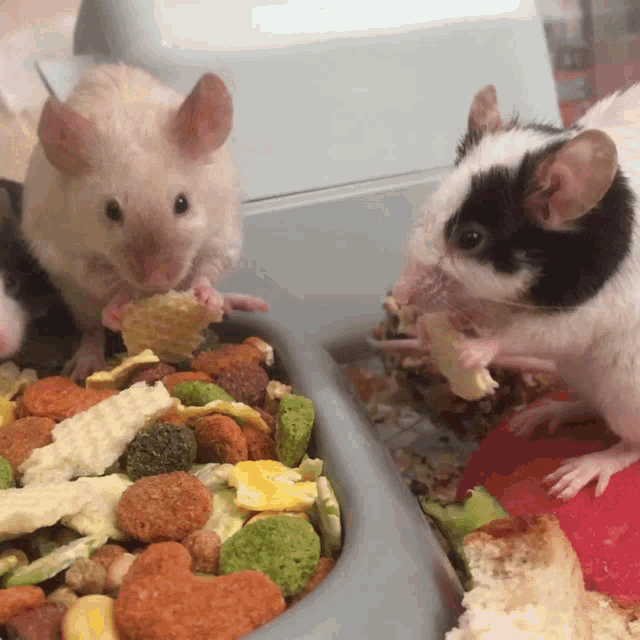
Conclusion:
Some good places to look for information about mice are pet mice, rats, and rodent centered subreddits and forums. There are also some good Youtubers that know lots about mice, such as Emiology, a personal favorite of mine.
Thank you for reading this far if you have. Ever since I first got mice I've fell in love with them and never understood the hatred people have towards these innocent and sweet babies. If my guide inspired you to purchase a pet mouse, I'd love to see pictures of them. You can E-mail me with pictures or even questions if you have any.